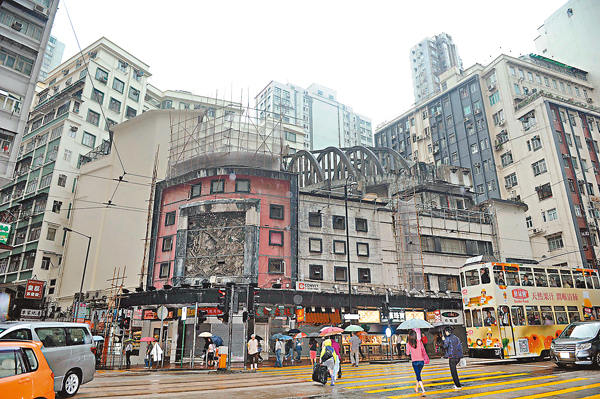 ■北角英皇道的舊皇都戲院現時去留未定。它是香港現存歷史最悠久的戰後戲院建築。 資料圖片
■北角英皇道的舊皇都戲院現時去留未定。它是香港現存歷史最悠久的戰後戲院建築。 資料圖片原文:皇都戲院(State Theatre)正門,多年前已租予攤販(vendor),銷售毛巾、煮食器具(cooking utensil)及塑膠玩具,兩旁掛滿五顏六色的雜牌背包,更凸顯出濃濃的「街坊味」(sense of neighborliness)。
推銷員錄音機(tape recorder)一直叫賣,偶爾還可吸引幾個途人(pedestrian)駐足,但更多人是匆匆走過,似乎已經忘記了這座建築曾經的輝煌。
1962年開業的「利昌士多(grocery store)」見證(witness)本港電影業興衰(ups and downs),由上世紀60年代市民排長龍(queue up)購票,直至90年代電視入屋,戲院生意開始走下坡(go downhill)。
憶李小龍電影帶動生意趣聞多
黎老闆憶述,「當時皇都戲院設置扶手電梯(escalator)好巴閉!」吸引不少市民特意試乘,當時全港只有中環萬宜大廈(Man Yee Building)設有扶手電梯。他記得每逢上演李小龍(Bruce Lee)的電影,排隊的人龍總是特別長,「買米酒(rice wine)及花生入場好尋常,士多生意都好好。」
他分享了不少趣聞。上世紀60年代很多上海人(Shanghainese)搬進皇都戲院大廈,因此有「小上海」之稱;直至七八十年代愈來愈多福建人(Fujianese)遷入,則改稱為「小福建」。
他又指,皇都戲院大廈由於位置便利,曾經有傳是不少警察包養姨太太(mistress)、用來金屋藏嬌的地方,說罷哈哈大笑。
曾氏兄弟70年代於英皇道(King's Road)開設「輝煌洋服」,受惠皇都戲院帶旺生意。兄長曾少文表示,通常9月起生意明顯增加,因為大家預備訂做新西裝(tailor-made suit)過年。
當時做一套西裝絕不便宜,一般白領(white-collar worker)每月工資1,000餘元,需要儲幾個月的錢才能訂做一套新西裝。全盛時期(peak season),每日起碼縫製10多套西裝,更需要聘請(recruit)外面的師傅幫忙。
熟客三代光顧 鏡框免費贈窮長者
不過時代(time)改變,西裝訂單愈來愈少。他們於1993年搬入皇都戲院時,行業(industry)亦開始走下坡,如今為客人改衫(clothing alteration)為主。
曾少文指合約(lease)至今年尾到期,不知業主是否願意續約,又無法負擔外面高昂租金,有心理準備結業(fold up)。「數十年最不捨得是做熟有感情(affection)」,他說。
公主眼鏡店(Princess Optical Co.)於1992年遷入皇都現址,老闆梁華成年過七十。梁先生說,這區不乏有錢人亦有不少窮困(impoverished)的長者,有時遇到長者明明眼鏡架(eyeglass frame)都已經壞掉,卻只夠錢配150元的鏡片(lens),便送出全新的(brand new)鏡框。開業數十年,與很多客人都很熟,不少是連續三代都來光顧。
古諮會(Antiquities Advisory Board)上月中旬開會,由於會上多名委員認為皇都戲院兼備歷史及建築價值(merit),建議評為高於三級的歷史建築,加上古蹟辦(Antiquities and Monuments Office)未提供足夠資料,因此押後表決其評級問題。
Grading pending, bonds remain at State Theatre
譯文:The entrance of the State Theatre has been leased out to vendors selling towels, cooking utensils and plastic toys for many years. Colorful backpacks of various brands are hung up for sale alongside the cinema complex, showcasing a vivid sense of neighbourliness.
Tape recorders shouting voices of salesmen occasionally catch the attention of pedestrians, but most pass by in a rush and do not seem to notice the glorious history of the building.
Opened in 1962, the "Lee Cheong" grocery store has witnessed the ups and downs of the local film industry. Even though the cinema was so popular in 1960s that people often had to queue up for film tickets, the business started going downhill in 1990s at a time when the television became a must in most households.
A bundle of intriguing anecdotes
"It was gorgeous to have escalators in the theatre at that time," recalled the grocery store owner Mr. Lai, who told that many people rushed there to have a try because it was the only place escalators were seen other than the Man Yee Building in Central. He remembered that every time Bruce Lee's movies were released, long queues would gather outside the cinema, "and it was common for people to snatch rice wine and peanuts before the shows began. It brought the grocery store a brisk business."
Mr. Lai had shared many other interesting stories: the complex was called a "petty Shanghai" in 1960s when many Shanghainese moved into the building; that it was later called "little Fujian" when Fujianese had taken the turn from 1970s to 1980s. The complex, according to rumors, due to its locational convenience, was an ideal place for a number of policemen to "raise" mistresses. "As the old saying goes: keep a mistress in a splendid abode," he burst out laughing.
Tsang Brothers established the "Fai Wong" tailor house on the King's Road in the 1970s. Their shop benefited from the cinema. The elder brother Mr. Tsang Siu Man recalled that orders would habitually rise in September, because most folks wanted tailor-made new suits at the turn of a new year. A new suit was expensive at that time; it could cost several months of savings, and the wage of an ordinary white-collar worker was just an average of about HK$1,000. During peak seasons, they had to craft at least 10 suits per day and would need to recruit tailors from outside.
Three generations of patronage
As times changed the sales started to fall. When the tailor house moved into the theatre in 1993, the tailoring industry had started going downhill, and their business finally changed from tailoring to clothing alteration.
Mr. Tsang worried that as the lease became due at the end of this year, he was not sure whether there would be a renewal of contract. Seeing that rental cost has become unaffordable nowadays, he is ready to fold up the business. "It is a pity to say farewell especially when you have developed quite an affection for the place over the past decades," he sighed.
The Princess Optical Co. has been in the complex since 1992. The owner Leung Wah Shing, over 70, described the district polarized between the utmost wealthy and the downright poor. Having occasionally seen elderly people with broken eyeglass frames, who could only afford lenses valued at HK$150, he would "donate" brand new frames. Running the business for a few decades, Mr. Leung has become familiar with the customers and some of them have patronized the shop over three generations.
The Antiquities Advisory Board held a meeting last month, in which certain members of the committee deemed that the State Theatre, a building with historical and architectural merits, should be given a classification above Grade III. But the board's panel has yet to propose a grading for it because of inadequate information provided by the Antiquities and Monuments Office.
Questions
1. 皇都戲院位於港島東區哪裡?
2. 皇都戲院的前身是什麼?
3. 戲院的屋頂因採用什麼設計而聞名?
4. 古蹟辦將香港的歷史建築分為三個級別,而對於具有非常重要價值的建築物,會列為什麼?
5. 文中「白領」的英文是white-collar worker,那麼「藍領」是?
Answer
1. North Point(北角)
2. Empire Theatre(璇宮戲院)
3. Parabolic roof trusses(拋物線型桁架)
4. Declared monument(法定古蹟)
5. Blue-collar worker
